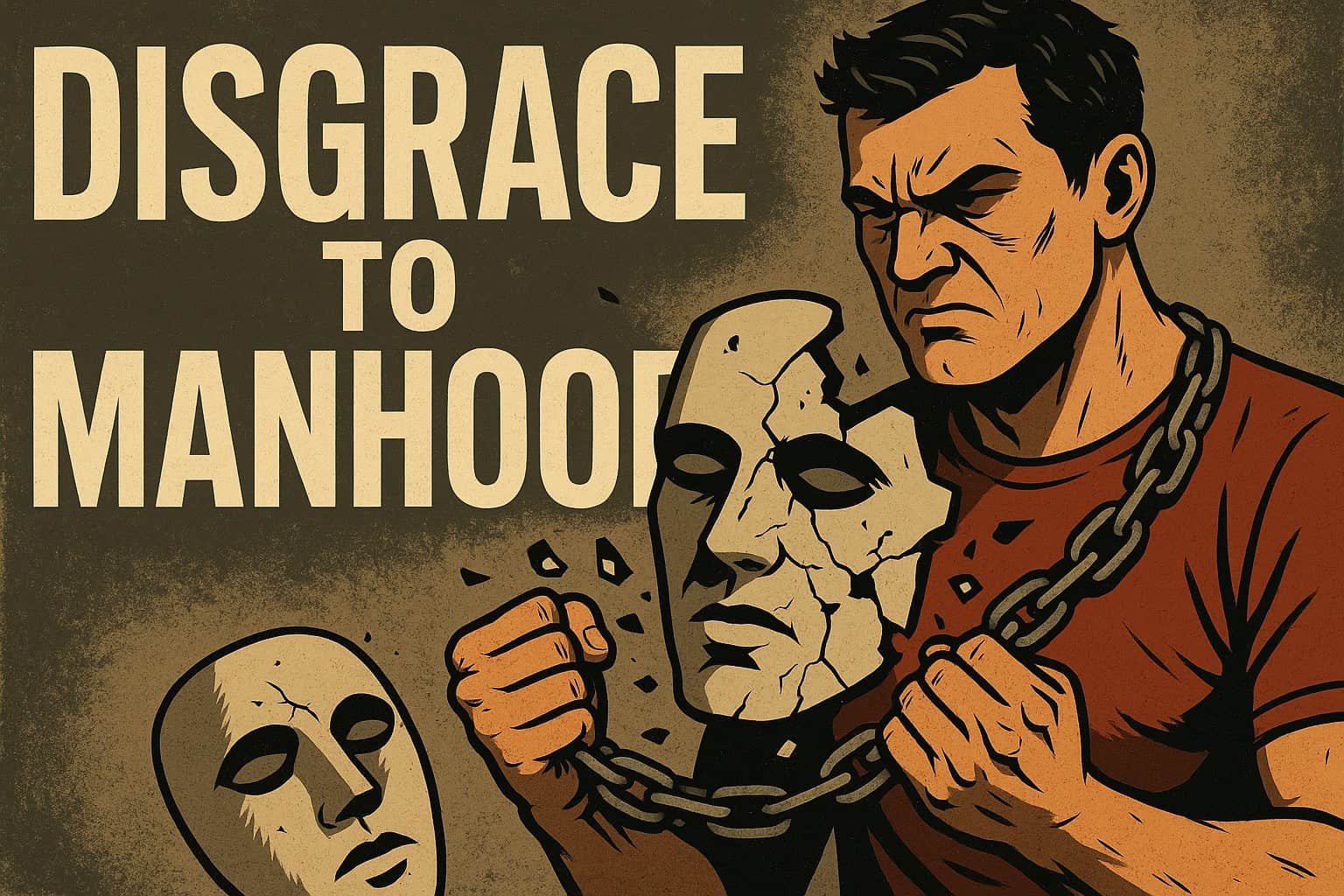Are you worried about becoming a disgrace to manhood or unsure if you’re on the right path? Recent studies show harmful stereotypes, called toxic masculinity, leave many men confused about their gender role and true identity.
In this post, you’ll learn four simple steps to redefine real masculine traits and build stronger emotional health. Read on to discover how redefining masculinity can improve your life now.
Key Takeaways
Toxic masculinity forces men into damaging roles—men face suicide rates four times higher than women do, accounting for 75% of all suicides.
Charles Kingsley once labeled dishonest men a “disgrace to manhood”, highlighting how honesty forms a foundation for healthy masculinity.
Redefining masculinity means owning your actions, improving emotional understanding, respecting yourself, and offering compassion to others.
A 2020 Pel study found that men who show empathy build stronger personal bonds and deal with conflict more effectively.
By 2025, the idea of masculinity will likely shift—from status and physical power to emotional wellness and stronger personal values.
Table of Contents
Understanding the Concept of “Disgrace to Manhood”

The phrase “disgrace to manhood” comes from old-fashioned norms dictating how men should behave. These outdated rules push men to hide their emotions, constantly act tough, and avoid anything labeled feminine.
Many men feel stuck in limited roles that don’t match their true selves. Society’s concept of masculinity has evolved quite a bit over the years—but men today still face judgment based on old standards, causing emotional distress and restricting personal growth.
Pressure from friends, family, and the media forces men into narrow definitions that may not fit. This harmful version of masculinity generates shame around normal feelings and actions that fall short of traditional expectations.
Outdated masculine expectations often discourage vulnerability and empathy in men. The patriarchal system teaches boys early on that crying shows weakness—and that asking for help means they’ve failed somehow.
Such damaging beliefs negatively affect men’s mental health and hurt their relationships too. Men deserve freedom from these rigid, unfair guidelines defining what’s manly and what’s not.
The next section explains specific traits and behaviors wrongly labeled as failures in masculinity—highlighting how these harmful ideas hurt real people. To start a healthier approach to becoming more manly, we need to identify and acknowledge these negative patterns first.
Traits and Behaviors Associated with “Disgrace to Manhood”

Certain traits mark a man as failing to meet society’s standards of true manhood. These behaviors show up in daily actions and choices, often causing harm to both the man and those around him.
Dishonesty and lack of integrity

Dishonesty cuts right into the heart of real manhood. Author Charles Kingsley called dishonest Catholic men a “disgrace to manhood”. Men who lie, cheat, or hide behind empty words shatter trust.
Broken trust weakens relationships, creating gaps between values and reality. Integrity is simple—it means your words and actions line up. Without that alignment, respect from friends disappears fast.
A man’s word must be his bond, for integrity forms the backbone of masculinity.
Men with self-discipline own their mistakes rather than taking shortcuts or making excuses. Charles Kingsley’s tale “The Water Babies” highlights exactly this point. Kingsley rejects the idea that confessing alone resolves moral failure.
Instead, he supports personal accountability over easy escapes or empty words. Honest men create solid friendships, enjoy stronger mental health, and build real inner strength. Your honesty shapes manhood far more clearly than muscles ever could.
Disrespect toward others

Disrespect appears in many forms, often damaging our sense of manhood. Guys who belittle others, cross boundaries, or crack mean-spirited jokes erode trust and weaken relationships.
I’ve known friends who lost jobs and partners, simply because they couldn’t resist putting others down to boost their ego. Anxiety and emotional struggles commonly fuel this behavior, especially in those who never learned healthier coping skills.
Real strength lies in showing respect to everyone—no matter their gender, position, or background.
Manipulation or deceit might seem like shortcuts to respect, but they backfire eventually. Society sometimes praises tough-guy attitudes, yet these norms reinforce toxic gender roles that hurt everyone involved.
Building true resilience takes empathy, not aggression or hostility. Your self-control is far more valuable than any display of power or dominance. By opening yourself to others and honestly caring about their experiences, you can escape the trap of harmful masculinity that hurts both you and everyone you care about.
Avoidance of responsibility

Being disrespectful often leads to another harmful habit—avoiding responsibilities. Real men accept ownership of their choices and actions. Yet many guys steer clear of difficult tasks or blame others if things go wrong.
This habit pops up in friendships, family situations, and at work. Some men neglect their children, fail to keep promises, or skip paying important bills. This behavior hurts the people close to them and adds to negative stereotypes about men.
Owning up to your mistakes openly builds trust and demonstrates strength of character. My dad once made an expensive mistake at work and admitted it without hesitation. His honesty earned the respect of his boss, and his team quickly rallied around him to deal with it.
Watching that taught me more about what it means to be a man than any lecture could have. Taking complete responsibility in your life means accepting both the good and the bad. Becoming a Chad isn’t about being physically perfect or overly dominant—it’s about facing life’s struggles without backing down.
Your mental health improves greatly once you stop avoiding issues and tackle them directly instead of becoming a Chad.
Toxic dominance and aggression

Men frequently feel pressure to prove their strength through dominance and force. This harmful behavior appears as shouting, threats, or even physical aggression intended to frighten others.
A study by Michelles and colleagues in 2019 showed that many men think anger is the only emotion safe enough to openly display. Holding this belief can lead men to cause damage at home, in workplaces, and among friends.
Toxic versions of masculinity praise aggressive actions and dismiss gentleness and compassion. Men who act that way often feel empty inside, even if they seem tough to those around them.
Constant pressure to dominate and outperform others creates emotional stress, damages connections, and hurts friendships. True strength is about managing yourself—not trying to control everyone around you.
Finding healthier ways to express feelings can help men step away from these damaging behaviors and live better lives.
The Role of Toxic Masculinity in Shaping These Behaviors

Toxic masculinity feeds harmful stereotypes that trap men within narrow expectations. Boys learn early to mask emotions, act tough, and reject anything labeled feminine. According to CDC data, men are four times more likely than women to die by suicide—and they account for 75% of all suicide cases.
Such alarming figures directly reflect the pressure men face to avoid asking for support. Many men think that dealing with problems alone is the norm, resulting in serious mental health struggles like anxiety, depression, or substance abuse.
The pressure to conform as either a “beta male” or a “real man” confines men within harmful boundaries damaging their emotional health.
Societal stigmas about masculinity push men into behaviors that hurt them and those around them. The macho ideal wrongly equates strength with dominance and paints emotional expression as weak.
Such black-and-white thinking interferes with meaningful relationships and creates internal conflict. To fulfill these strict standards, men often conceal how they actually feel. The ManUp Campaign clearly notes a connection between these cultural expectations and the tragically high suicide rates among men.
Moving beyond these harmful patterns involves forming new ideas of masculinity rooted in honesty, empathy, and self-worth. Leadership isn’t about controlling others—it’s about compassion, understanding, and respecting diverse gender identities and ways of self-expression.
How to Avoid Becoming a “Disgrace to Manhood”

Becoming a true man means more than just acting tough or hiding feelings. The path to genuine manhood starts with honest self-reflection and the courage to break free from harmful gender norms that hurt both you and others.
Be accountable for your actions

Owning your actions is central to real manhood. A genuine man takes responsibility for his mistakes—no excuses, no finger pointing. Charles Saftner demonstrated this clearly through his committed parenting, showing how accountability earns respect.
Men gain trust from others, and self-confidence too, by admitting errors and fixing them.
A man’s character isn’t measured by his successes, but by how he handles his failures.
Owning errors means learning from past missteps to become stronger. You grow when you confront tough truths about the impact your choices have on people around you. Letting go of denial eases your mental load and boosts emotional health.
Honest reflection on mistakes usually reduces stress—surprising, but true. Facing facts also helps break harmful social expectations that stop men from owning their behavior.
Develop emotional intelligence
Men often bottle up their feelings, ignoring them until they erupt in harmful ways. Building emotional intelligence allows you to spot anger, sadness, or fear—before these emotions control your actions.
Naming your emotions clearly gives you power over them. This ability reduces your stress levels and also helps you build deeper connections with people around you. Opening up to trusted friends about how you feel can lead to more meaningful conversations than just chats about sports or work.
Being emotionally honest can significantly improve your mental health. Instead of burying problems deep inside, emotional awareness helps you tackle issues directly, preventing them from growing larger.
Small habits, like taking five deep breaths before responding to an upsetting incident, can make a difference. Pay attention to physical signals your body gives as emotions arise, such as tightness in your chest or tense shoulders.
These signs remind you to pause—and carefully choose your response. Another key step to becoming a better man is genuinely caring about others’ feelings and showing compassion in everyday actions.
Practice self-respect and discipline
Self-respect stands at the core of genuine masculinity. Guys who respect themselves set firm boundaries at work and in relationships. They choose dignity over activities or actions that weaken their self-worth.
I discovered this through tough moments, after letting friends push me into choices that left me feeling empty. Honoring your own standards first makes it easier to set clear limits with others.
Discipline turns good intentions into real outcomes. It guides your decisions, especially when feelings become intense or confusing. A disciplined man keeps his word and consistently shows up.
This builds trust with others—and confidence within yourself. Discipline doesn’t require strict rules; instead, it’s about making daily choices aligned with your core beliefs. Small actions, taken consistently each day, improve your physical fitness and mental clarity over time.
Show compassion and empathy
Real men show kindness to those around them. Compassion means taking the time to understand another person’s feelings, without judging them. I learned this lesson personally, after realizing my quick temper was hurting people I cared about.
True masculinity involves allowing others to express their emotions openly—and stepping in to give support when needed. A study by Pel in 2020 shows that men who practice empathy create stronger bonds and handle disagreements better.
Being empathetic doesn’t make men weak—it actually strengthens personal relationships. Start practicing with easy, everyday actions: fully listen without rushing to respond, ask clear questions to better understand feelings, and offer comfort without jumping in to fix the situation.
Some men fear that emotional openness could threaten their masculinity. This fear builds walls between us and the people we care about. Letting go of such social expectations opens the door to deeper friendships and improved mental health.
Redefining masculinity means pushing against outdated gender roles that limit personal growth.
Challenging Stereotypes and Redefining Masculinity

Challenging traditional beliefs about masculinity begins by rethinking what society has taught us. Growing up, many boys are told things like “boys don’t cry” or “man up”, but these phrases hold us back.
I myself once felt confined by these expectations—until the day I saw my dad shed tears at my graduation. That moment opened my eyes: strength can appear in many forms. Modern gender studies now question these fixed views on manhood, making space for all men to fully be themselves.
Turning away from old-fashioned stereotypes doesn’t lessen your manhood—it makes you more human. Genuine masculinity includes qualities society wrongly labels as feminine, such as compassion, emotional openness, and reaching out for support.
Men have the opportunity to redefine masculinity in ways that truly reflect who they are. This means stepping up against harmful social expectations, which often cause mental stress and keep men from growing personally.
Moving ahead involves changing personal beliefs and tackling broader societal issues. Many guys discover that trying out new ideas of masculinity boosts their mental health and creates better bonds with friends.
Honest conversations and clear education on masculinity help people see that being a man isn’t about fitting into one narrow category. Strong role models matter a great deal—they show young guys how to develop positive, healthy masculinity without any harmful baggage attached.
The Importance of Positive Role Models for Men

Positive male role models shape how boys and men understand masculinity. They offer examples of true strength, without falling into traps like violence or hiding feelings. Such men demonstrate courage alongside kindness—they remain firm in their beliefs, yet respect other people’s views.
These role models step beyond narrow stereotypes, proving real strength involves empathy as much as physical toughness. By following their lead, younger men find healthy ways to face emotions, avoid mental distress, and steer clear of harmful behaviors like drug use or self-harm.
Community support among men creates open spaces to express genuine masculinity. Mentors, supportive groups, and trusted friends help men feel comfortable sharing honest emotions. This openness breaks down harmful walls of hypermasculinity.
Podcasts like “The New Masculine” offer practical insights to leave old-fashioned, limiting ideas behind. Watching other men confidently share feelings gives younger males permission to value their own emotional health.
Strong connections inspire men to challenge biased views, promoting inclusivity over marginalization. Real manhood respects every person’s identity—including LGBTQ+ individuals—and rejects rigid, binary definitions of gender.
How Will the Concept of Manhood Evolve in 2025?

By 2025, manhood will likely move beyond outdated ideas tying masculinity to wealth, social power, or physical strength. Instead, men will focus more openly on their emotional health and mental well-being.
This shift will push past traditional, rigid views that discourage men from expressing their feelings. Social networks and online communities will play a large part in this movement—as men safely share views on emerging definitions of masculinity, without fear of judgment.
The future definition of manhood will rest on personal character and values instead of old stereotypes. Men will reject harmful behaviors—the ones causing emotional pain—and instead embrace empathy, accountability, and openness.
Teen boys will notice these higher standards, learning early that real strength sits within character and emotional honesty. Cultural attitudes will encourage men who break traditional gender roles, making room for open conversations about social pressures and the harm from strict expectations.
People Also Ask
What does “redefining masculinity” mean in today’s culture?
Redefining masculinity involves letting go of outdated gender roles and stereotypes. It challenges traditional views on manliness, which can cause emotional harm. Instead, it encourages men to embrace ideas of masculinity that support mental wellness, personal expression, and diverse identities.
How do social stigmas affect men’s emotional state?
Social stigmas pressure men to conceal their true emotions, causing internal struggle and emotional pain. Many men avoid discussing personal issues openly, fearing judgment or mockery from friends and peers. This silence often isolates men socially and emotionally, making challenges even heavier.
Can literature like “The Tragedy of Othello, The Moor of Venice” teach us about toxic masculinity?
Yes, literature often highlights harmful ideas around masculinity. In Shakespeare’s play “The Tragedy of Othello, The Moor of Venice”, Othello’s jealousy, pride, and rigid ideas about manhood cause destruction in his relationships. Stories like these show clearly how strict gender ideals can ruin people’s lives.
Why is adolescence a critical time for developing healthy views on gender?
The teenage years are key for shaping healthy ideas around gender. Teen boys face heavy social pressure from friends, family, and popular media. These sources frequently push narrow, stereotypical images of what it means to “be a man”, often prompting unhealthy attitudes around gender to form during this sensitive phase.
How does curiosity help men overcome prejudice about femininity?
Curiosity encourages openness and the desire to learn about others’ experiences. Approaching femininity with a positive, interested mindset instead of fear allows men to overcome gender biases. This attitude helps men appreciate diverse gender expressions and promotes more understanding, balanced views.
What role does physical health play in redefining masculinity?
Physical health shapes men’s self-image and confidence significantly. Moving beyond typical “tough-guy” attitudes—like ignoring pain or avoiding medical care—helps prevent serious problems such as drug addiction and chronic illness. Men who openly value and care for their physical health without embarrassment set healthier examples of masculinity.
References
https://speedypaper.com/essays/category/human-behavior
https://speedypaper.com/essays/category/gender
https://waterbabiesweb.wordpress.com/2020/12/22/roza2/ (2020-12-22)
https://issuu.com/the_hoya/docs/guhoya110124.a1-merged-compressed
https://www.psychologytoday.com/us/blog/overcoming-destructive-anger/202204/why-masculinity-doesnt-have-to-be-toxic (2022-04-30)
https://openscholar.dut.ac.za/bitstreams/f088ae98-5d94-4c28-8936-e7f5af44264e/download
https://escholarship.mcgill.ca/downloads/4m90dx25t.pdf
https://papersowl.com/examples/the-demise-of-manhood-unveiling-the-depths-of-disgrace/
https://www.positivemasculinitynow.org/post/how-to-be-a-male-role-model
https://pmc.ncbi.nlm.nih.gov/articles/PMC10286188/
https://onepercentcloser.com/disgrace-to-manhood-the-harsh-truth-and-how-to-rise/

